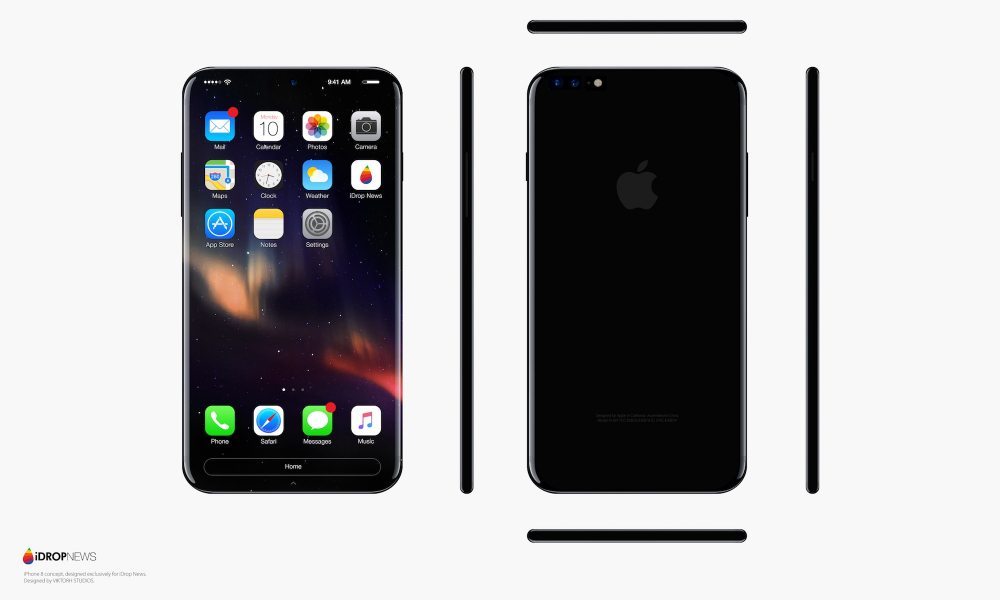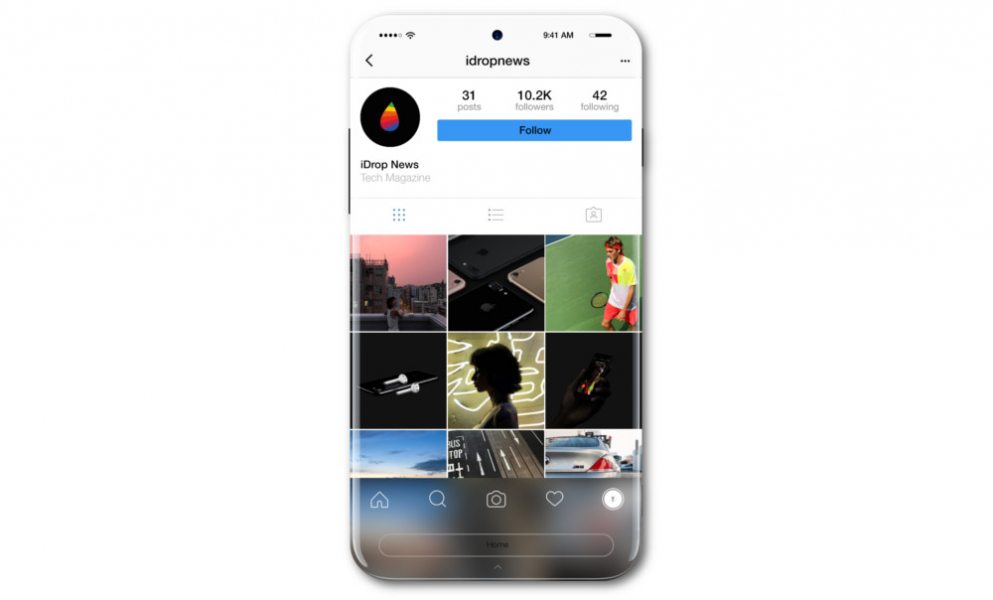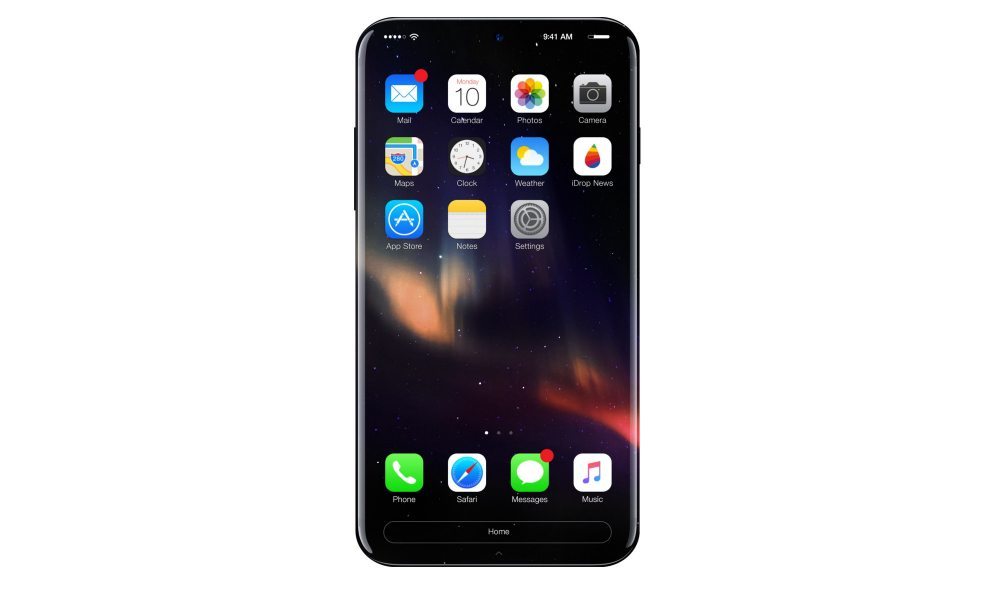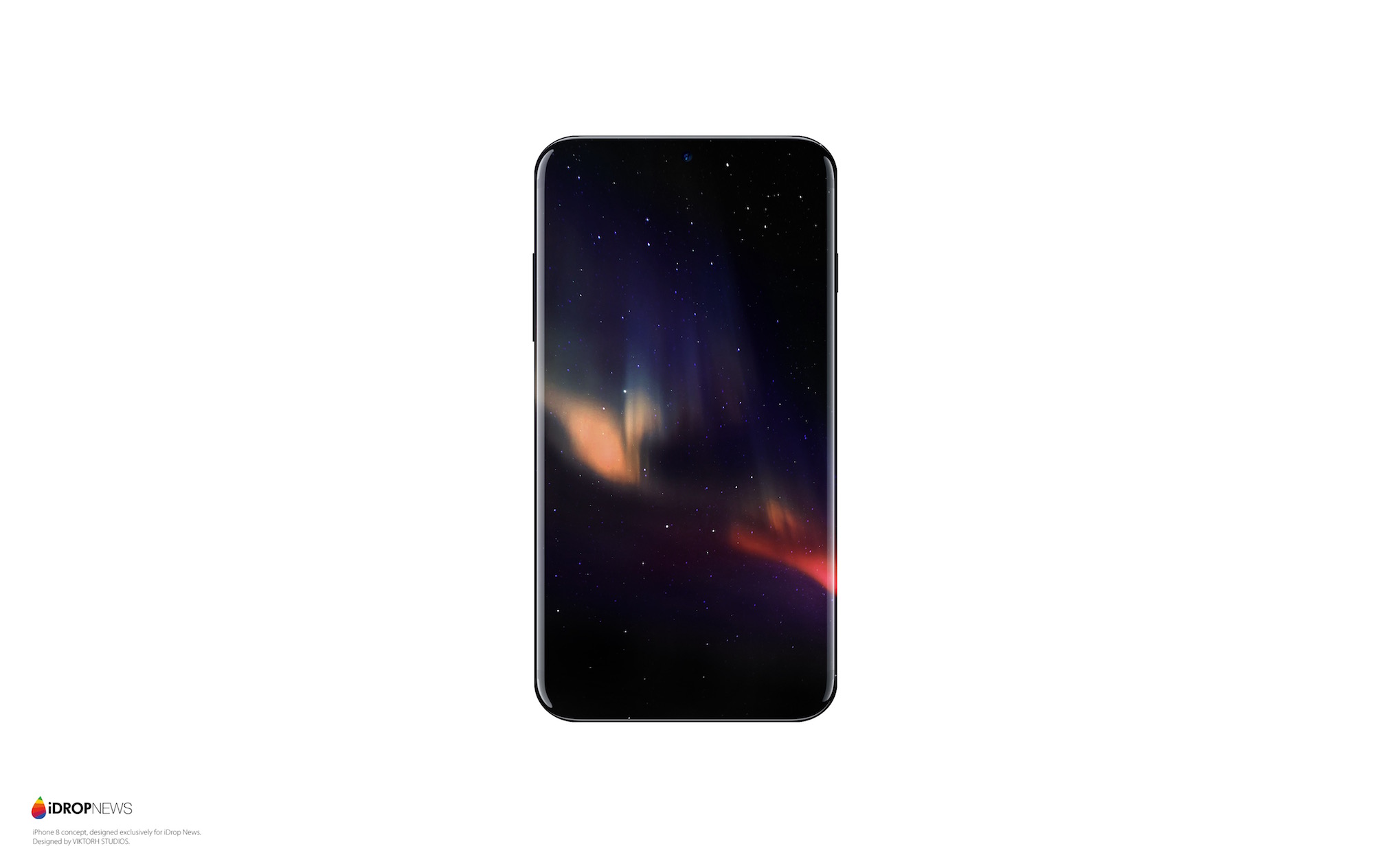Could This Be the iPhone 8? Here’s the Design and Features We Expect to See

© Copyright 2016 iPhone 8 Concept Exclusive, iDrop News. Attribution required. Do not modify.
Toggle Dark Mode
iDrop News has taken every piece of reliable information available today to create a vision of the world’s most advanced smartphone, the iPhone 8. View our complete iPhone 8 gallery at the bottom of this page.
Apple is world-renown for its keen ability to design and produce some of the tech industry’s most stunning products and most user-friendly operating systems; best of all, everything “just works.” No company integrates its products as seamlessly as Apple does, and when you buy into the Apple ecosystem you know that you’re receiving something truly special. Another interesting facet of Apple Inc. is the company’s secrecy. No other company receives more prying eyes than Apple, as consumers insist on being on the forefront of the company’s technological advancements.
While Apple is a lockbox of surprises, information does come floating to the surface allowing us to assemble the most realistic expectations for what Apple’s 10th anniversary iPhone 8 will look like and the newest technologies it will possess.
Based on tangible data from previous versions of the iPhone, current implementations, leaked information, and market expectations, we can make accurate predictions concerning the next generation of Apple’s iPhone, the iPhone 8, which we are expecting to be the biggest change to iPhone since its inception.
New White iPhone 8 Color Option

© Copyright 2016 iPhone 8 Concept Exclusive, iDrop News. Attribution required. Do not modify.
Apple’s iPhone has been available in a variety of color schemes for years, most recently adding Rose Gold and Jet Black into the mix; and with that in mind, it’s safe to say Apple’s highly-anticipated iPhone 8 redesign will in fact introduce a new color option for selective consumers to choose amongst. Considering Apple borrows design elements from other devices to create design harmony, and based on confirmation coming from semi-reputable sources, we can say with near certainty that Apple will release a pure white color scheme for the iPhone 8, not unlike the gorgeous white ceramic Apple Watch Edition. A white iPhone 8 will certainly satisfy the tastes of modernists and nostalgists alike, considering Apple’s legacy iPhone 4 and 4s devices, which featured an all-white glass body, are widely regarded as two of Apple’s most aesthetically-pleasing products ever created.
Bezel-less OLED Display

© Copyright 2016 iPhone 8 Concept Exclusive, iDrop News. Attribution required. Do not modify.
No one can deny the iPhone 7’s display is gorgeous, however like everything in life, there’s always room for improvement. Apple’s iPhone 7 uses a wide color gamut LCD display that produces color accuracy and warmth that’s nearly unbeatable. While the screen that the iPhone 7 currently deploys is great, OLED displays offer similar quality, offering darker blacks, and at the same time consume less power. Consumers have, time and time again, reported that battery life is the most important factor when purchasing a smartphone. Apple is well aware of the importance of stellar battery life and switching to an OLED display is one of the most crucial steps Apple can take to conserve the iPhone 8’s battery. It hasn’t yet been confirmed the iPhone 8 will employ an OLED display, however market trends and recent announcements from Sharp, Apple’s most prominent display manufacturer, suggest the aforementioned company will invest $588 million dollars into its OLED display business over the next few years, seemingly confirming the majority of this investment will be used to satisfy the needs of the iPhone 8’s production.
In an exclusive interview with two prominent, well-connected Barclay’s analysts, Business Insider, citing sources with deep ties to Apple’s Far East supply chain, reported the Silicon Valley tech-giant is gearing up to introduce larger iPhone displays next year. Not only will the standard, 4.7-inch iPhone jump up to a 5-inch panel, but the larger 5.5-inch Plus model is said to be jumping up to a whopping 5.8-inch curved OLED display.
Iris Scanning Security Mechanism
In 2014, Apple was allegedly investigating including the technology on its phones, and was experimenting with how the iPhone’s existing sensors — like the compass and accelerometer — could improve facial recognition. And more recently, leaked investor documents also seem to confirm that Apple is expected to include features such as biometric facial recognition and iris scanning as soon as 2017. Additionally, Apple currently owns a number of patents concerning facial recognition technology, including a patent describing how 3D rendering could lead to better accuracy. Earlier this year, Apple purchased a startup called Emotient, which was developing technology that used artificial intelligence to read facial expressions. In November of last year, it also acquired the motion capture company FaceShift, all of which points to iris scanning security features being developed and deployed on Apple’s iPhone 8.
No Home Button

© Copyright 2016 iPhone 8 Concept Exclusive, iDrop News. Attribution required. Do not modify.
The round home button has been an iPhone staple since day one – it’s a key design element that separates the iPhone 7 from its competitors; however some might argue that the home button seems a little stale. While it is functional, it’s not exactly new, and to some, it’s actually unnecessary. Phones running Android have done away with physical home buttons in many incarnations including Google’s own smartphone, the Google Pixel. Like the scenario we experienced with the removal of the iPhone 7’s headphone jack, removing the home button will add more space the device, which will make room for more highly-desired features, like a larger display. Consumers want a smartphone that offers the largest display, packed into the smallest device possible, and removing the home button is the first step in the process.
Touch ID
It’s expected that the iPhone 8 won’t feature a home button, and it’s reasonable to wonder where Apple might place the iPhone 8’s Touch ID sensor, which allows us to easily unlock our iPhones with a simple press of a finger. Recently, Apple has been awarded a patent to employ the Touch ID sensor directly within the iPhone 8’s display. The patent, titled “Man-machine interface for controlling access to electronic devices”, describes three different methods of integrating the Touch ID sensor underneath the display. “Optical”, “Capacitive”, and “Ultrasonic” methods are all described in detail, the latter of which being the most intriguing. Removing the home button and featuring Touch ID directly within the display will create a futuristic and minimalist approach to the security mechanism, and we are very excited to see this come to fruition deployed on the iPhone 8.
Available in 3 Sizes, All Glass Design
It has been voiced by several people close to the company’s supply chain that Apple will release three sizes of the iPhone 8, adding a 5-inch model in addition to the 4.7-inch, and will ultimately bump up the 5.5-inch iPhone Plus model to a whopping 5.8 inches. The report claims that all three models will “have glass backs, departing from metal casings adopted by current iPhones, and China’s Biel Crystal Manufactory and Lens Technology is likely to be providing all the glass backs for the new iPhones next year.” Ming-Chi Kuo echoed the return to a glass enclosure last month, when he claimed that the next generation iPhone would return to glass front and back design akin to the iPhone 4 and 4s, noting that the high-gloss finish of the Jet Black iPhone 7 has been so popular, but that glass would prove more scratch resistant. Kuo’s claim that, also like the iPhone 4s, the glass front and back will likely be combined with aluminum casing around the edges or with stainless steel for ‘high-end models’. Keep in mind, a larger display on Apple’s iPhone 8 won’t necessarily mean a larger phone, in fact, all leads point to Apple’s iPhone featuring a bezel-less edge-to-edge display – meaning a larger display packed into a chassis of a familiar size.
Storage Capacity
Based on market trends and Apple’s current storage capacity options for the iPhone 7; the iPhone 8 will most likely be available with the same three storage capacity options including 32GB, 128GB, and 256GB. 32GB has proven to be sufficient storage for most iPhone owners, while 256GB will prove to be enough for power-users, sitting at the top-tier of the options available.
Pricing
Apple has been criticized in the past, and even currently, for over-pricing certain products. Most recently the 2016 MacBook Pro saw a major price increase, pushing the product’s availability out of financial feasibility for many consumers. However, this hasn’t been the case with Apple’s iPhone 7, as consumers have reported the device’s price meets expectations for quality and value. Even though the newly redesigned MacBook Pro received a major boost in price, up roughly $200 dollars for the base model, the laptop computer continues to sell like hotcakes. While Apple’s iPhone 7 hit the nail on the head, in regards to pricing strategy, we can predict based on the major changes being deployed for the iPhone 8, the price of the newest iPhone will increase by at least $50 dollars for the base model, and continue the trend for the 5” iPhone 8, and again for the largest top-tier 5.8” iPhone 8 Plus.
The iPhone 8 will certainly be a revolutionary device for Apple and consumers alike. We can expect it to be officially announced in the fall of 2017. Follow iDrop News on Facebook, Twitter, Google+, and Apple News for updates on Apple’s upcoming iPhone 8.
iPhone 8 Image Gallery
© Copyright 2016 iPhone 8 Concept Exclusive, iDrop News. Attribution required. Do not modify.
[The information provided in this article has NOT been confirmed by Apple and may be speculation. Provided details may not be factual. Take all rumors, tech or otherwise, with a grain of salt.]






